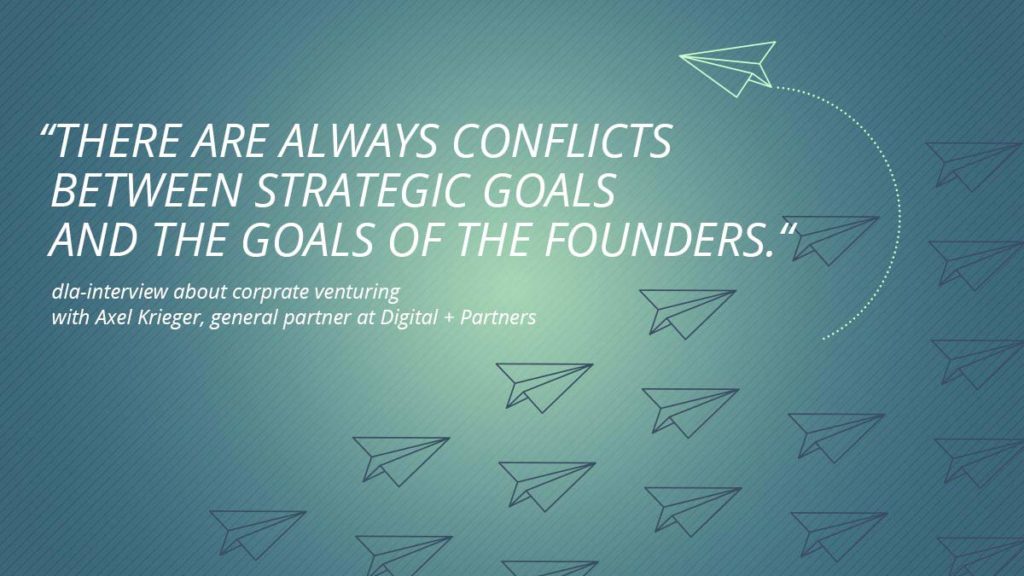
Mr. Krieger, in order to keep up the fast pace of competition, more and more corporations are no longer content to rely solely on their R&D departments. Instead, they’re bringing in external assets – talent, knowledge, patents. How well do corporations stand up to traditional VCs?
Axel Krieger: That’s a tough question. The logic behind these kinds of purchases is that they generate opportunities. They get you access to new expertise and know-how, help you back innovative ideas with the necessary capital and can even act as a sort of “self-fulfilling prophecy”. On the other hand, they inherently create conflicts of interest between the founders of the start-ups and other shareholders. The founders want to use the sale to maximise the value of their company, while the corporations have their own strategic goals, like acquiring new technology. These goals are usually incongruent with one another. What’s more, the value of the start-up goes down once it’s acquired. Competitors will now be more reluctant to buy the company or its products.
In line with their strategic outlook, oftentimes, corporations also view start-ups as a sort of virus. Once they’ve vaccinated the existing organisation, they’re meant to “infect” the whole company with their dynamism, competitive ability and culture. How often does this approach actually pan out?
Axel Krieger: By and large, it doesn’t work. Usually, the original start-up staff leave the company pretty quickly. The cultures and mentalities, goals and such are hardly ever compatible.
Is there any way for corporations to counteract this effect in their venturing projects? Say, by appointing the heads of the start-ups they acquire or fund to their own executive boards? Or use the two-speed concept, meaning organisationally and even geographically separate units, to protect the acquired companies from the structural pressure of a corporation?
Axel Krieger: Corporations need to do both. But few of them ever try, and even fewer do so consistently, long-term and with ultimate success. In the tech sector, for example, SAP has always managed to bring in the top people from the companies they acquire. It’s also hard to create a protected organisation, a company within a company, within a corporation. A relatively recent case where this seems to have worked is when Jaguar came out with their I-Pace electric SUV. It’s a really exciting project, and definitely one that is being studied by everyone in the industry as a model for success.

Let’s talk about the I-Pace for a second. It’s a great example. This is a car that was developed by a team that was spread out across the globe. Production is going to be entirely outsourced. The electric car start-up “Evelozcity”, which was founded by former top automotive managers, is also taking a very lean approach. The company is founded on an ecosystem. What role does a sustainably successful corporate venturing strategy play in networking? How good are corporations at that?
Axel Krieger: Networks are hugely important in all the issues we’ve talked about. But internal networking, into the corporation, is at least as important as external networking. One excellent example is the BMW Startup Garage, which brings young companies into the ecosystem of BMW and, in turn, gives the corporation access to talent and new technology.
Generally speaking, what prerequisites do corporations need to meet in order for corporate venturing to succeed?
Axel Krieger: It’s important to define what’s required and to be clear on any potentially conflicting goals – conflicts between strategic and financial goals, between strategic goals and the goals of the founders. They need to be aware of the fact that joining a corporation can restrict the growth of the startup. If the goals and expectations are clear, realistic and shared, then corporate venturing should be part of a portfolio of ideas that also includes concepts like BMW’s Startup Garage, internal venturing and traditional M&A.

Digital+ Partners is an experienced growth equity investor focusing on market leaders in the B2B and SaaS sectors in Germany and internationally. Digital+ Partners plays an active role in the digital transformation of the broader industrial and financial technology ecosystems, providing growth capital and scale-up support to companies with the ambition to become world market leaders in their field. Digital+ Partners pursues investments in rapidly growing technology companies with proven products differentiated by software, data analytics and B2B online enablement. Digital+ Partners creates value by providing deep operational/strategic and corporate finance advice to the management teams of their portfolio companies in order to best define and execute their growth plans. For more information please visit: http://www.dplus.partners
